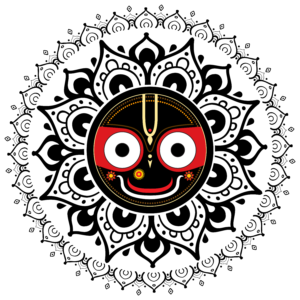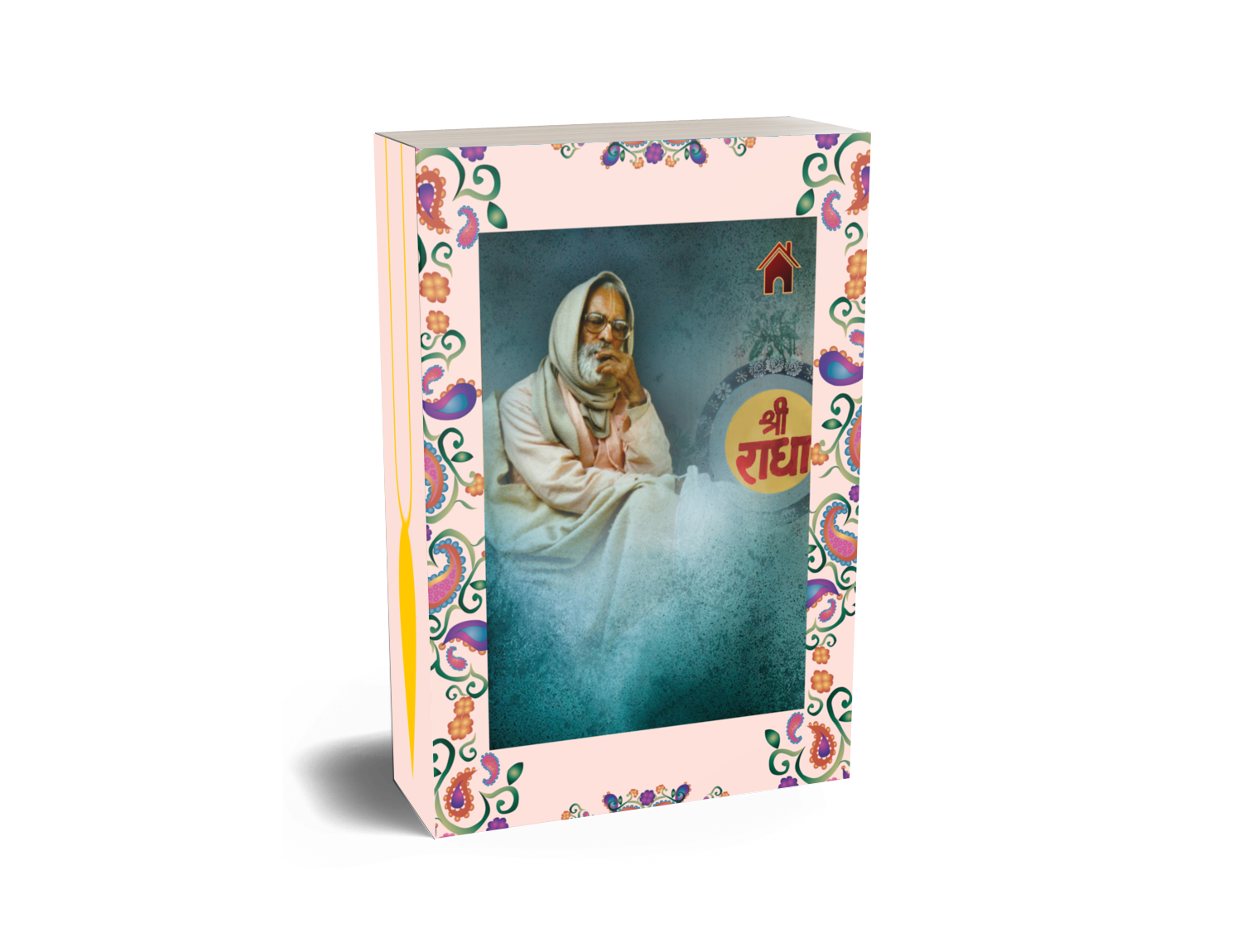

Chapter 2 from the book Śiva-Tattva: The Post and the Person by Śrīla Bhaktivedānta Nārāyaṇa Mahārāja
Śrī Nārada desired to proclaim the glories of Lord Śiva. As previously described, he praised Śiva as the greatest 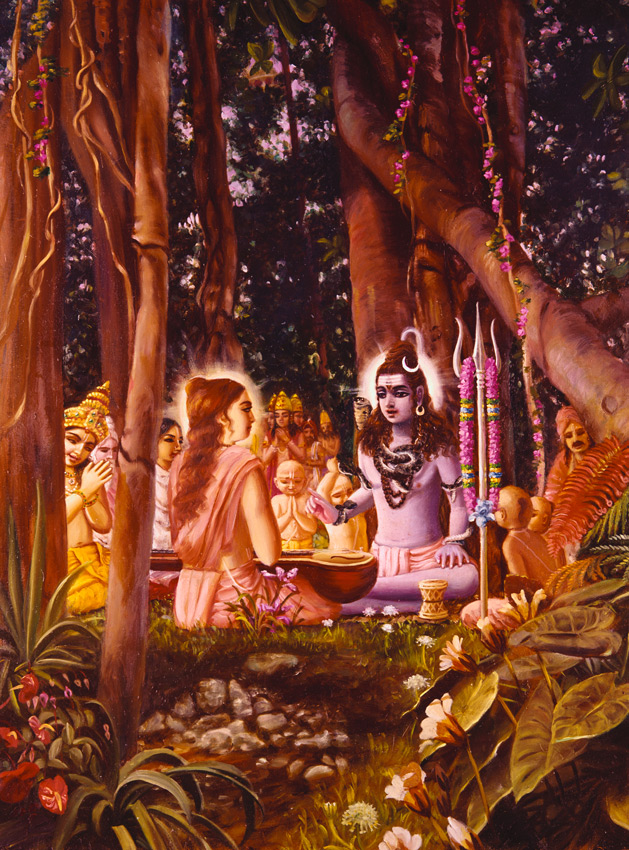 devotee of Lord Kṛṣṇa and most dear to Him, and Lord Śiva became upset by hearing those praises. Śiva then related a number of incidents which, according to him, were evidence that he was not dear to Kṛṣṇa at all.
devotee of Lord Kṛṣṇa and most dear to Him, and Lord Śiva became upset by hearing those praises. Śiva then related a number of incidents which, according to him, were evidence that he was not dear to Kṛṣṇa at all.
Now Lord Śiva compares himself to Śrī Prahlāda Mahārāja,* the famed devotee of Lord Nṛsiṁhadeva described in Śrīmad-Bhāgavatam. He told Nārada, “Śrī Prahlāda Mahārāja is superior to me, and it is he who is the dear devotee of the Lord.” Even though Lord Śiva is superior to Prahlāda Mahārāja, he told Nārada that Prahlāda Mahārāja is superior. Why? He said this to encourage people to follow Prahlāda Mahārāja’s ideal character and teachings.
However, Prahlāda Mahārāja cannot enter Śrī Kṛṣṇa’s transcendental abode, Vṛndāvana, whereas Lord Śiva 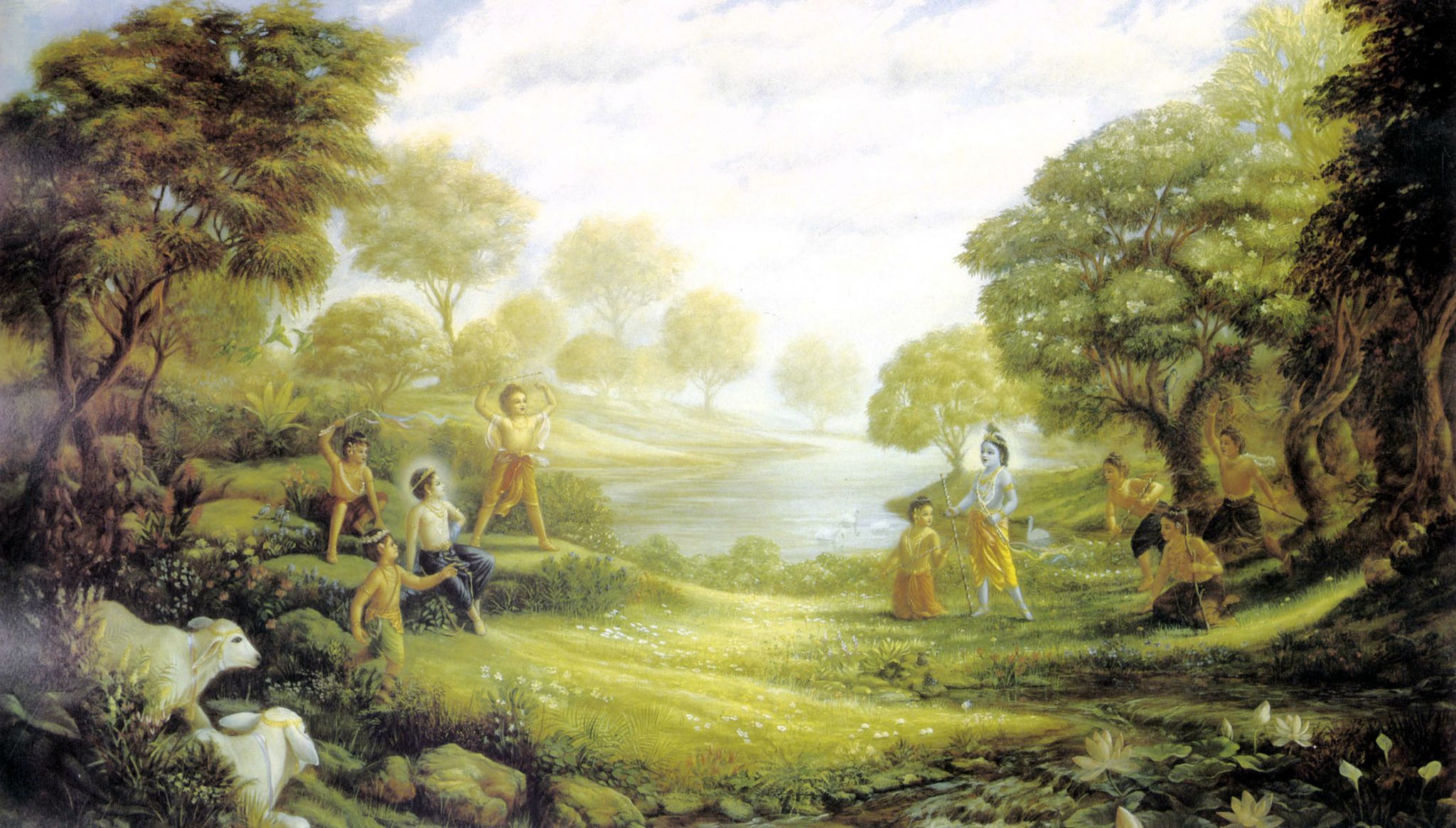 resides there eternally as Gopīśvara. Śiva serves Śrī Kṛṣṇa personally in numerous ways. He and his wife
resides there eternally as Gopīśvara. Śiva serves Śrī Kṛṣṇa personally in numerous ways. He and his wife
Pārvatī-devī meditate on aṣṭa-kālīya-līlā, Lord Śrī Kṛṣṇa’s confidential eight-fold daily pastimes. These secret pastimes are very confidential, yet both Śiva and Pārvatī are able to meditate upon them. Śiva is hundreds of thousands of times superior to and more worshipable than Śrī Prahlāda Mahārāja, and yet the artful Śiva declared Prahlāda Mahārāja to be superior. Why did he do so? In one sense Prahlāda Mahārāja is superior, and in another sense he is not.
We can reconcile this by considering the two perspectives from which to understand the identity of Lord Śiva: We can see Śiva from the point of view of his post, and also from the point of view of his personality. As a personality, separate from his post, he appears as an associate of the Supreme Lord, such as Gopīśvara, Hanumān and Bhīma. As Gopīśvara he resides eternally in Vṛndāvana. As Hanumān he always associates with and serves Lord Rāma. As Bhīma he always serves Lord Kṛṣṇa. And, when Hanumān and Bhīma combine 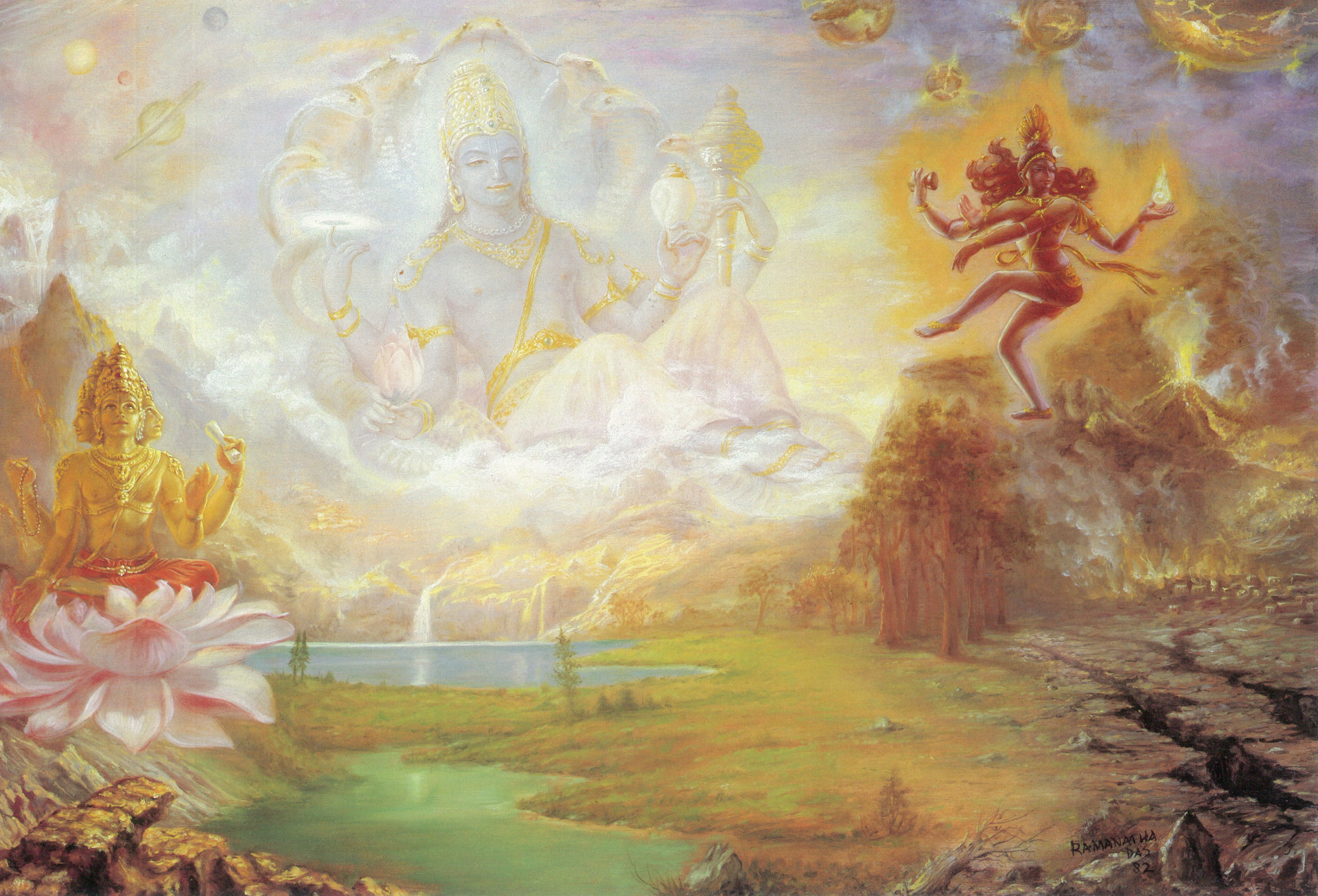 together in this present age of Kali-yuga, they become Madhvācārya, our Sampradāya-guru.**
together in this present age of Kali-yuga, they become Madhvācārya, our Sampradāya-guru.**
From the point of view of Lord Śiva’s function as the god of annihilation, and also that of Brahmā as the secondary creator of the universe, Śiva and Brahmā are actually posts. Lord Brahmā and Lord Śiva are not ordinary human beings, but their posts are like that of the president or prime minister of a nation, wherein the man representing the post has to perform a certain defined job.
Both as the post and the person, Śiva is superior to Brahmā. Lord Śiva is an expansion of Lord Viṣṇu, but sometimes a jīva (living entity) may become Śiva’s expansion known as Rudra. If a man purely performs the duties of varṇāśrama for one hundred births, he may become Brahmā.*** In other words, he may attain the position or post of Brahmā. In turn, when a person in the post of Brahmā carries out his function expertly for one hundred births, he becomes qualified to perform the function of Śiva in his manifestation as Rudra. Śiva’s post is therefore superior to that of Brahmā, and this is also evidence that Śiva is more powerful than Brahmā.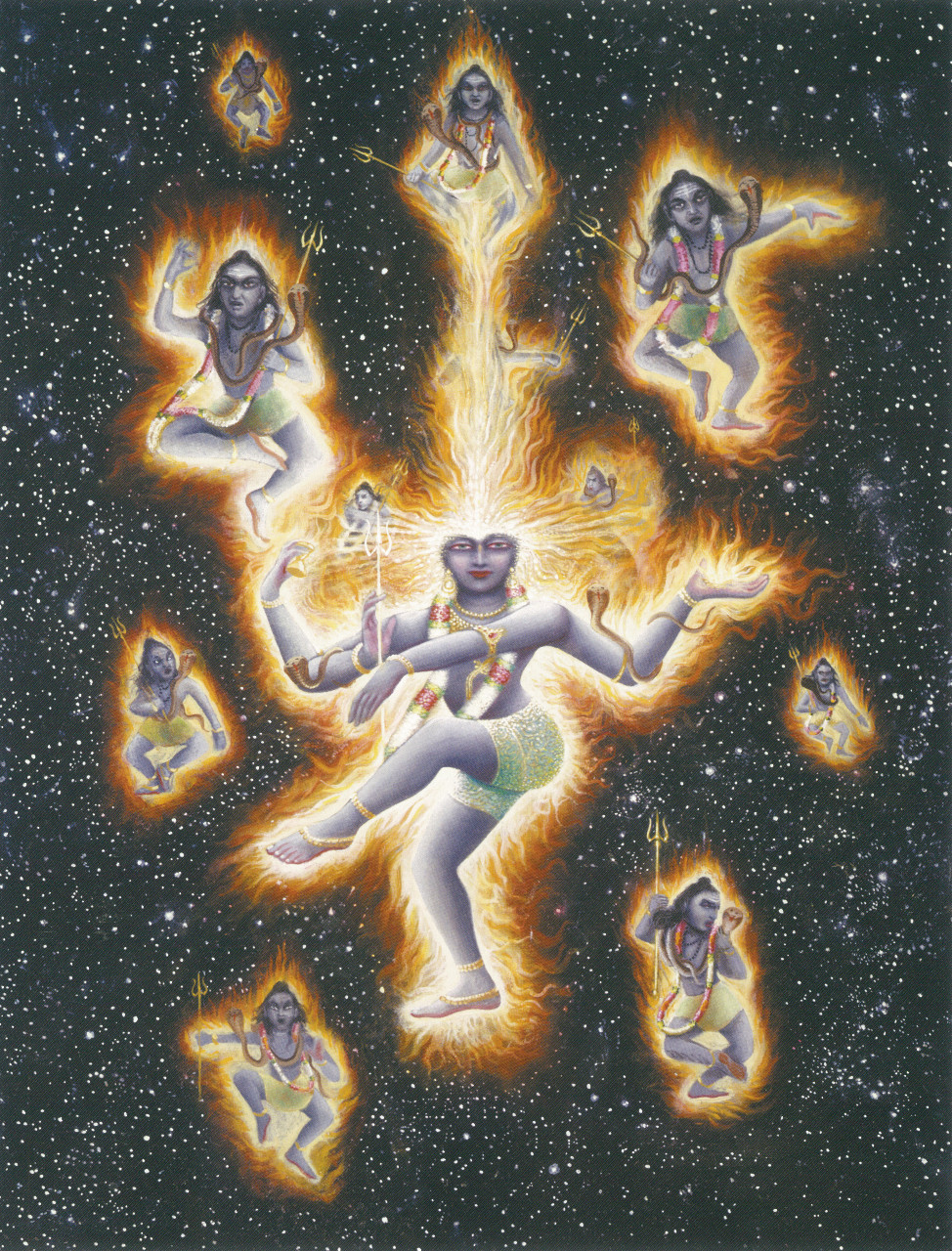
What is the function of Lord Śiva’s post, and why is it superior to that of Lord Brahmā? One reason is that Brahmā cannot execute pralaya, the complete destruction of the universe – a very dangerous thing, whereas Śiva can do so.
Śiva’s function as destroyer is similar to that of a farmer who plants and cultivates a large area of wheat. The farmer carefully waters and nourishes the crop, guarding it from animals, and after five or six months the wheat matures and ripens. Then, either by hand or a machine, the farmer harvests the plants and carefully removes the grains from their shafts. The rest of the plant matter becomes refuse, and subject to rotting and attracting disease, vermin, and snakes. Therefore, the farmer sets fire to it and burns it.
Just as the farmer extracts the grains from the plants, Lord Śiva extracts the eternal spirit souls from their material bodies and the world. At the time of annihilation he creates an inferno, setting the entire universe on fire, but the spirit souls are not destroyed.
There are two kinds of universal devastations: one at the end of Lord Brahmā’s day and one at the end of his life. At the end of his day (4,320,000,000 solar years) he rests in a mystic sleep within the body of Garbhodakaśāyī Viṣṇu, and all the conditioned living entities enter as well.****
While the entire universe is submerged in water, the living entities rest in their subtle bodies within the transcendental body of Garbhodakaśāyī Viṣṇu. They await the start of the next day of Brahmā, the next material creation or manifestation. Some of them become liberated, and others do not.
When Lord Brahmā completes the one hundred celestial years of his life, Lord Śiva again performs this duty of destruction. At that time all the spirit souls enter into the body of Kāraṇodakaśāyī Viṣṇu or Mahā-Viṣṇu. At the end of each day of Lord Brahmā, all souls enter Garbhodakaśāyī Viṣṇu, and at the end of Brahmā’s life, even the millions of manifestations of Garbhodakaśāyī Viṣṇu enter Kāraṇodakaśāyī Viṣṇu***** along with the spirit souls. At the time of creation, Kāraṇodakaśāyī Viṣṇu generates innumerable manifestations of Garbhodakaśāyī Viṣṇu, and at the time of complete annihilation, they enter back into his body.******
Lord Śiva is not a living entity, but he is also not in the category of Lord Viṣṇu. He is much more powerful than any living entity, even up to Lord Brahmā. However, he is not equal to Lord Viṣṇu. Because he is almost as good as the Supreme Personality of Godhead, he can see the three phases of time: past, present and future. One of his eyes is like the sun and another is like the moon. He also has a third eye, located between his eyebrows. It is from this third eye that he generates fire and employs it at the time of the universal destruction.
Seen from this perspective – the destroyer – Lord Śiva cannot serve Śrī Kṛṣṇa directly, because he is engaged at his post. Those souls who are liberated after hundreds of thousands of lifetimes of devotional practice, having renounced all responsibilities and concerns of the world – including occupations like that of Brahmā and Śiva – and who constantly hear about, glorify, and remember Lord Kṛṣṇa, take birth in this world as pure devotees like Prahlāda Mahārāja. This was told by Lord Śiva to Śrī Nārada.
Prahlāda Mahārāja has nothing to do with this world; nothing to create or demolish. He rejected all such affairs 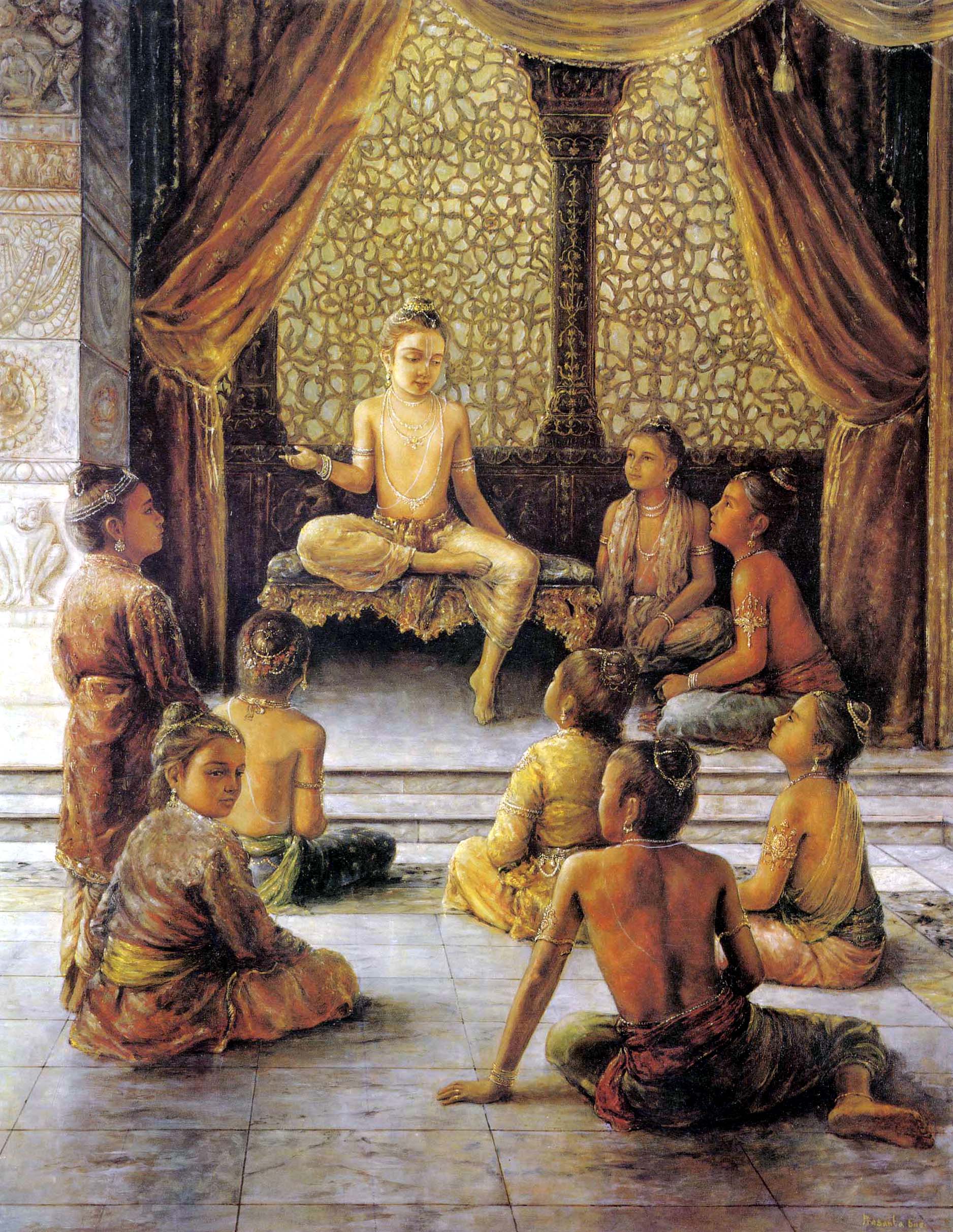 as insignificant. Although he had inherited a large kingdom, it was controlled and governed by his ministers. His senses were totally absorbed in the transcendental loving service to the Supreme Lord. He was always engaged in hearing the name and glories of the Lord, singing and speaking about his glories, remembering and meditating on him, offering prayers, carrying out his orders and fully surrendering to him.
as insignificant. Although he had inherited a large kingdom, it was controlled and governed by his ministers. His senses were totally absorbed in the transcendental loving service to the Supreme Lord. He was always engaged in hearing the name and glories of the Lord, singing and speaking about his glories, remembering and meditating on him, offering prayers, carrying out his orders and fully surrendering to him.
Devotees in Prahlāda’s category have no need to approach Lord Kṛṣṇa’s manifestations like Lord Nṛsiṁhadeva and Lord Rāma, for the Lord personally comes to them in these forms. Lord Śiva told Śrī Nārada that because he is always engaged in the post of controlling the universe, he can neither see nor offer services to the Lord daily, as Prahlāda Mahārāja sees Lord Vāmanadeva or Lord Nṛsiṁhadeva. Vāmanadeva and Nṛsiṁhadeva are both manifestations of the same Lord, who regularly gives Prahlāda his divine association and the opportunity to serve and offer obeisance at his lotus feet.
Although both Brahmā and Śiva are actually superior in bhakti (devotion) to Prahlāda Mahārāja, their posts involve contact with the three guṇas, or modes of material nature, namely goodness, passion and ignorance. The role of Lord Brahmā is creation and procreation in raja-guṇa, the mode of passion. Lord Śiva’s role of demolition and dissolution is in tama-guṇa, the mode of ignorance. It is for this reason that they are called guṇa-āvatāras, incarnations of the material qualities.
Prahlāda Mahārāja is nirguṇa, transcendental to the three modes of nature. He has nothing to do with activities in material goodness, passion, and ignorance, by which this world is shackled. Lord Śiva is also beyond the three modes of nature, but he adopts the mode of ignorance (tama-guṇa) to efficiently perform his function.
Regarding Lord Śiva’s glorification of Prahlāda Mahārāja, now consider Lord Śiva’s identity as a transcendental personality – separate from his post.
Sometimes senior Vaiṣṇavas express sincere recognition of the novice, inspiring him or her on the path of  devotion. The Vaiṣṇava may say, “Oh, you work so hard and earn money, and with that money you support and nourish me. I have no means at all. I do nothing but visit for a short while, eating and sleeping at your expense. I would not be able to speak the glories of Lord Kṛṣṇa at this festival if you had not arranged for the management of all the activities here, so you are superior to me.”
devotion. The Vaiṣṇava may say, “Oh, you work so hard and earn money, and with that money you support and nourish me. I have no means at all. I do nothing but visit for a short while, eating and sleeping at your expense. I would not be able to speak the glories of Lord Kṛṣṇa at this festival if you had not arranged for the management of all the activities here, so you are superior to me.”
Out of sincere humility, gratitude and affection, liberated souls speak in this endearing manner, and at the same time they are fixed in the realization that they are always being personally maintained by the Supreme Lord. The senior Vaiṣṇava has the disciple’s personal benefit in mind.
However, Lord Śiva was not speaking for Prahlāda Mahārāja’s benefit, but to acquaint aspiring devotees with the stages of devotion. His desire was to facilitate the service of Śrī Nārada Muni and Śrīla Sanātana Gosvāmī, whose mission was to establish in the world the sequence of the grades of devotion and ultimately establish the glories of the gopīs. Try to understand all these truths, and seek to gradually become firmly situated in bhakti.
Imagine that you are in a market in which there are thousands of varieties of shops. In some of those shops there are products made of iron, in some shops there are products made of gold, in some there are jewels, and in others cintāmaṇi (wish-fulfilling stones). An expert is guiding you through all the shops, pointing out different products and revealing which are superior.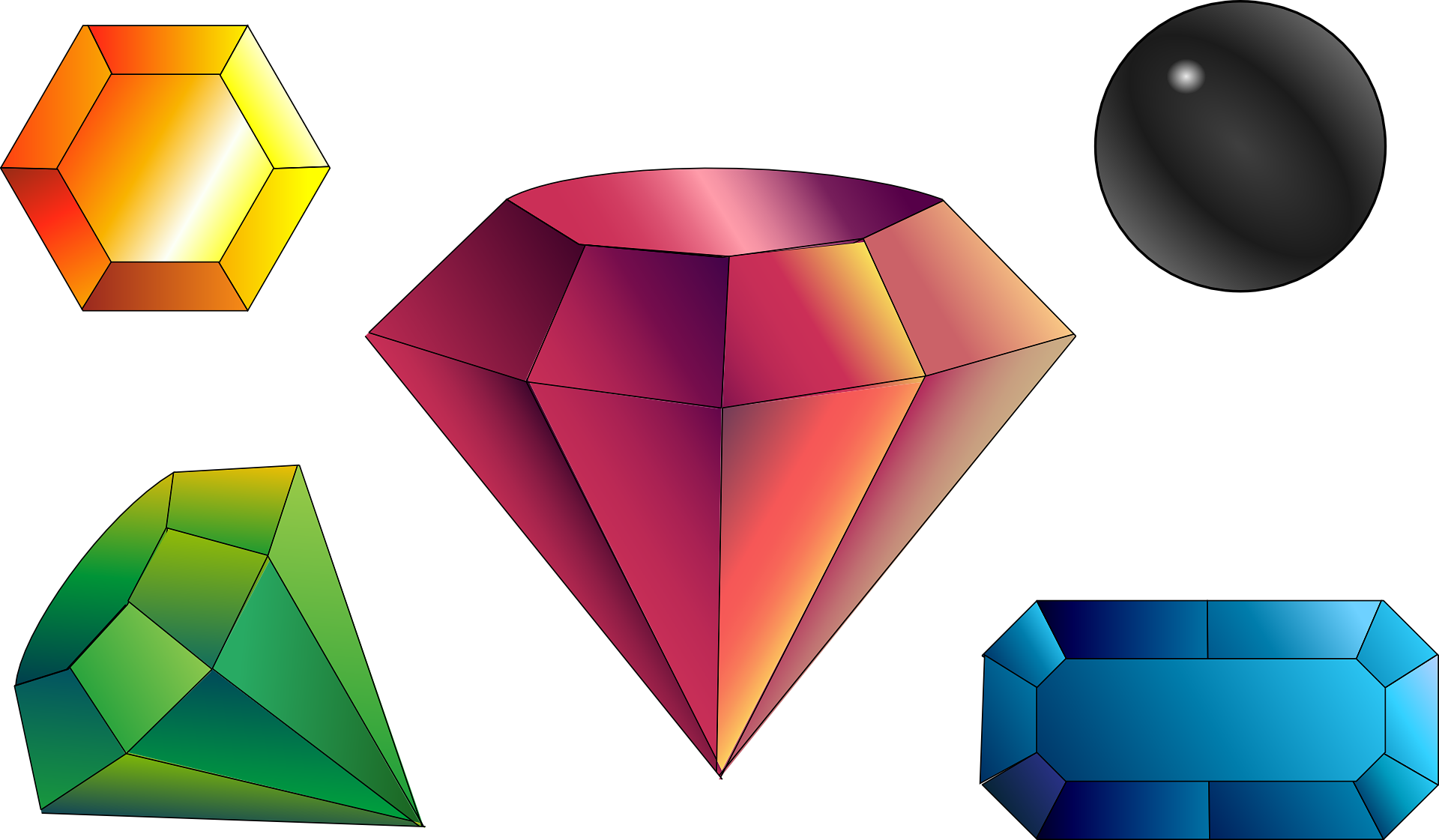
If there are a thousand pounds of iron and only one ounce of gold, the gold has more value. On the other hand, many pounds of gold will not amount to the value of one Kaustubha-maṇi or a similarly precious stone. Millions of such precious jewels cannot compare with a tiny quantity of cintāmaṇi, and even millions of cintāmaṇi stones cannot compare with one holy name of Lord Kṛṣṇa.
Now suppose someone is chanting the name of Lord Kṛṣṇa alone, and another is absorbed in the name of Rādhā-Ramaṇa. The name Rādhā-Ramaṇa, meaning Śrī Kṛṣṇa, the enjoyer of pastimes with Śrīmatī Rādhārāṇī, has more transcendental taste (rasa) than the name Kṛṣṇa alone. The person absorbed in that holy 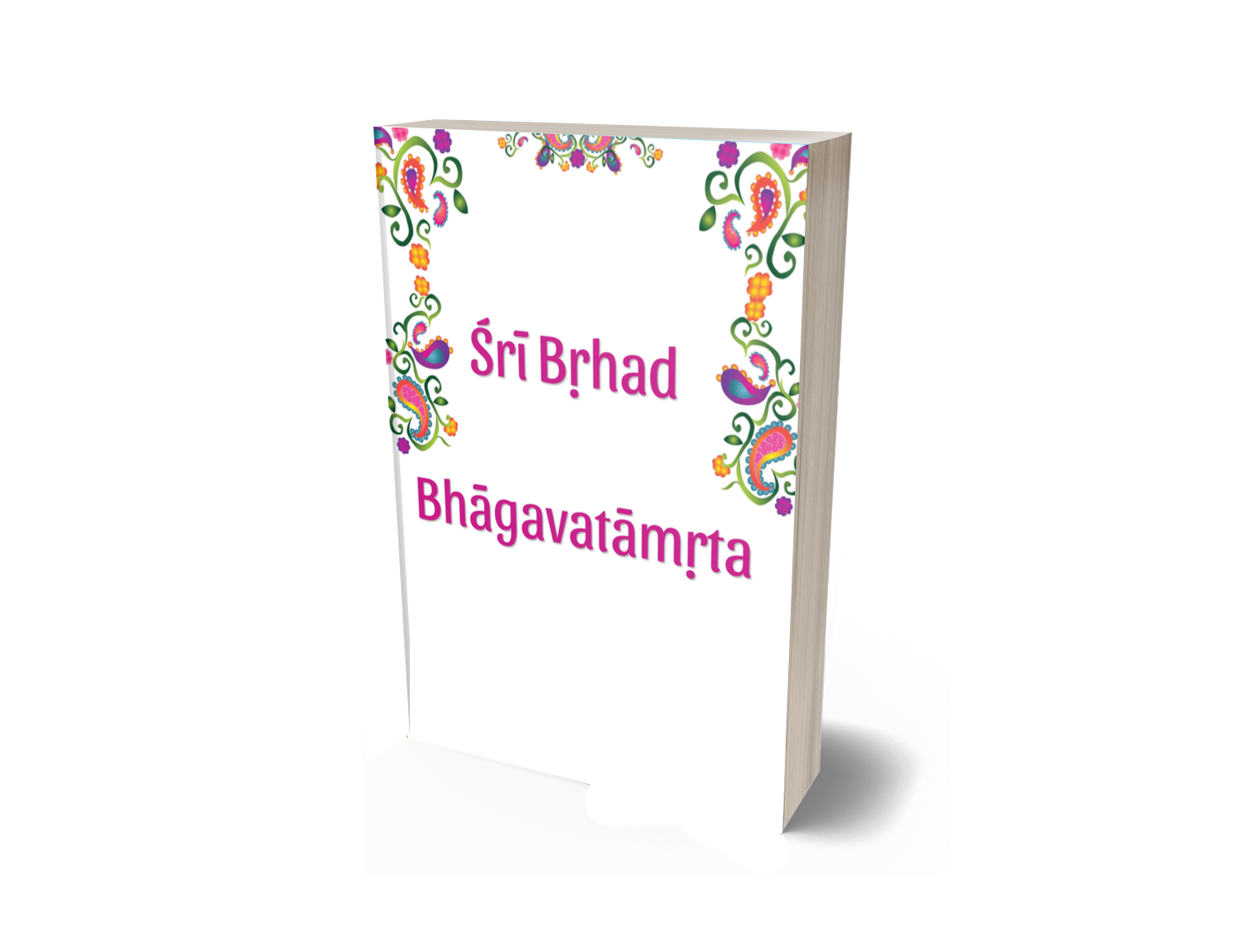 name will therefore experience a greater spiritual pleasure.
name will therefore experience a greater spiritual pleasure.
Regarding the analogy of the shops in a market, that expert tells you, “This shop is good, that shop is better, and this one is the best. Similarly, in his Śrī Bṛhad-bhāgavatāmṛta, Śrīla Sanātana Gosvāmī establishes the gradations of excellence of various devotees and their devotion, in order to help his readers determine their spiritual path.
The history of Nārada Muni’s coming to the abode of Lord Śiva and glorifying him was first narrated in this Śrī Bṛhad-bhāgavatāmṛta. Like Śrīla Sanātana Gosvāmī, Nārada is also that expert described above. He desired to establish pure bhakti in the world, and therefore he played the role of searching for the greatest devotee and recipient of Lord Kṛṣṇa’s mercy. His search had taken him first to 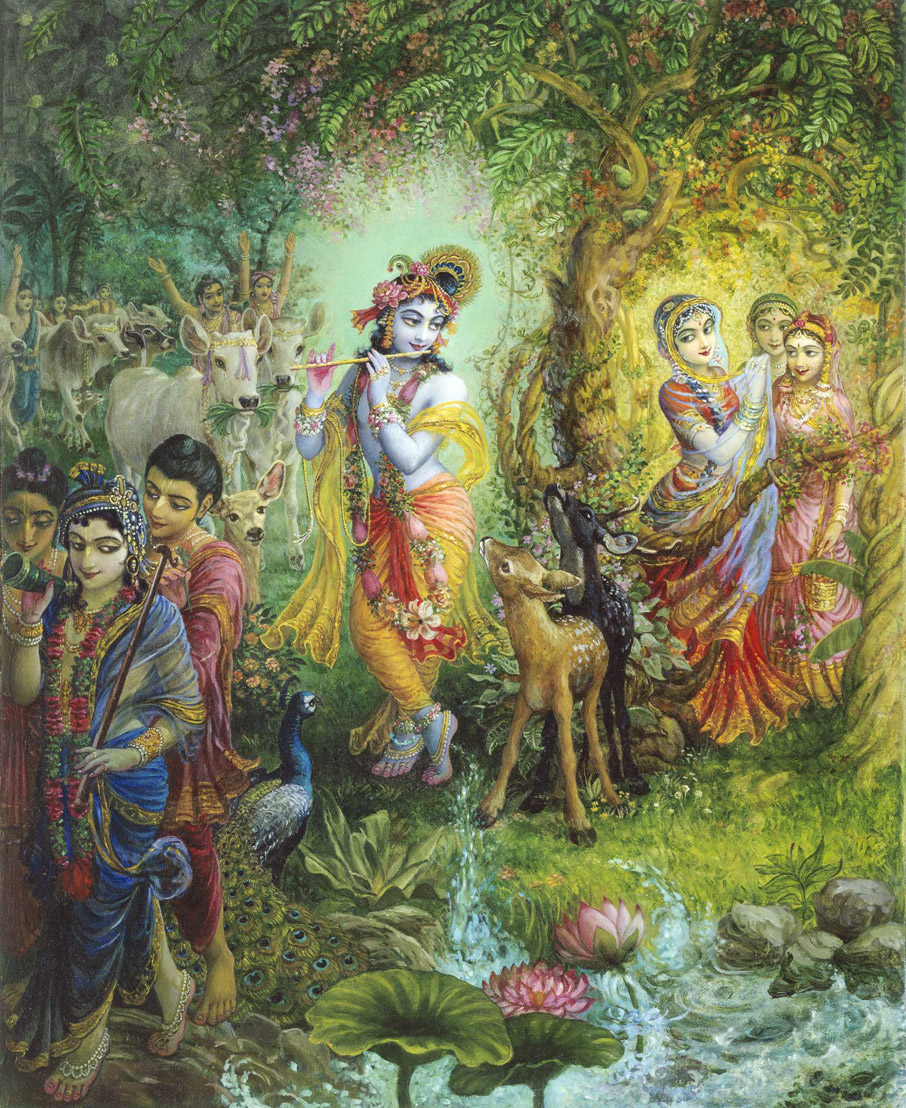 the ‘shop’ of a brāhmaṇa in Prayāga, and after that to South India, to the shop of a king. Then he travelled to heaven, where he entered the shop of King Indra, and Indra sent him to the shop of Lord Brahmā. Brahmā sent him to Lord Śiva, and Lord Śiva is now sending him to Prahlāda Mahārāja. Gradually, Śrī Nārada will bring us to the greatest recipients of Lord Kṛṣṇa’s mercy, the gopīs. In the form of Gopīśvara, Lord Śiva is the beloved servant and associate of those gopīs.
the ‘shop’ of a brāhmaṇa in Prayāga, and after that to South India, to the shop of a king. Then he travelled to heaven, where he entered the shop of King Indra, and Indra sent him to the shop of Lord Brahmā. Brahmā sent him to Lord Śiva, and Lord Śiva is now sending him to Prahlāda Mahārāja. Gradually, Śrī Nārada will bring us to the greatest recipients of Lord Kṛṣṇa’s mercy, the gopīs. In the form of Gopīśvara, Lord Śiva is the beloved servant and associate of those gopīs.
* In the hermitage of Śrī Nārada Muni, Prahlāda Mahārāja heard the message of Śrīmad-Bhāgavatam while within the womb of his mother. From his birth, Prahlāda was fixed in the transcendental realization of the all-pervading presence of the Supreme Lord, and he preached love of God to his schoolmates at the tender age of five. Despite efforts by his atheistic father to change his nature – efforts that culminated in repeated attempts to kill him by means of administering poison, putting him in boiling oil, tossing him from the top of a cliff and so on – Prahlāda continued to experience great joy by remembering Lord Viṣṇu and chanting his holy names. Prahlāda was protected by the Supreme Lord in every situation. Finally, Lord Viṣṇu appeared in the form of a half-man, half-lion and killed his demonic father. When offered a benediction by the Lord, Prahlāda simply asked for the liberation of his father, as well as that of all conditioned souls. He is honoured in this world by all pure devotees.
** “Śrīla Madhvācārya is the original ācārya for those who belong to the Madhva-Gauḍīya-sampradāya.”(SB 6.1.40 purport) “This Madhva-Gauḍīya-sampradāya is also known as the Brahmā-sampradāya because the disciplic succession originally began from Brahmā. Brahmā instructed the sage Nārada, Nārada instructed Vyāsadeva, and Vyāsadeva instructed Madhva Muni, or Madhvācārya.” (Kṛṣṇa Introduction).
*** “The Vedas say, ‘Svadharma-niṣṭhaḥ śata janmabhiḥ pumān viriñcatām eti – One who strictly follows the principles of varṇāśrama-dharma for at least one hundred births will be rewarded with the post of Lord Brahmā.’ ” (Śrīmad-Bhāgavatam 5.20.33 purport) Varṇāśrama-dharma – the institutions dividing society into four divisions of social life and four occupational divisions of castes.
**** “At the beginning of Brahmā’s day, all living entities become manifest from the unmanifest state, and thereafter, when the night falls, they are merged into the unmanifest again. Again and again, when Brahmā’s day arrives, all living entities come into being, and with the arrival of Brahmā’s night they are helplessly annihilated.” (Bhagavad-gītā 8.18-19)
“At the end of the day, under the insignificant portion of the mode of darkness, the powerful manifestation of the universe merges in the darkness of night. By the influence of eternal time, the innumerable living entities remain merged in that dissolution, and everything is silent.” (Śrīmad-Bhāgavatam 3.11.28)
“The dissolution of the three worlds is effected by the incarnation of darkness, Rudra, represented by the fire of eternal time which blazes over the three worlds.
These three worlds are known as Bhūḥ, Bhuvaḥ and Svaḥ (Pātāla, Martya and Svarga). The innumerable living entities merge into that dissolution, which appears to be the dropping of the curtain of the scene of the Supreme Lord’s energy, and so everything becomes silent.” (Śrīmad-Bhāgavatam 3.11.28 purport)
“It is said that the blazing fire from the mouth of Saṅkarṣaṇa rages for one hundred years of the demigods, or 36,000 human years. Then for another 36,000 years there are torrents of rain, accompanied by violent winds and waves, and the seas and oceans overflow. People forget all these devastations of the worlds and think themselves happy in the material progress of civilization. This is called māyā, or ‘that which is not.’” (Śrīmad-Bhāgavatam 3.11.31 purport)
“Thereafter, at the end of the millennium, the Lord Himself, in the form of Rudra, the destroyer, will annihilate the complete creation as the wind displaces the clouds. This creation is very appropriately compared to clouds.” (Śrīmad-Bhāgavatam 2.10.43)
***** “There are two types of dissolution of the manifested cosmos. At the end of every 4,320,000,000 solar years, when Brahmā, the lord of one particular universe, goes to sleep, there is one annihilation. And at the end of Lord Brahmā’s life, which takes place at the end of Brahmā’s one hundred years of age, in our calculation at the end of 8,640,000,000 x 30 x 12 x 100 solar years, there is complete annihilation of the entire universe, and in both the periods both the material energy called the mahat-tattva and the marginal energy called jīva-tattva merge in the person of the Supreme Lord.” (Śrīmad-Bhāgavatam 10.21 purport)
****** “Kāraṇodakaśāyī Viṣṇu is the first incarnation of the Supreme Lord, and he is the master of eternal time, space, cause and effects, mind, the elements, the material ego, the modes of nature, the senses, the universal form of the Lord, Garbhodakaśāyī Viṣṇu, and the sum total of all living beings, both moving and nonmoving.” (Śrīmad-Bhāgavatam 6.42)
Source: Purebhakti.com
Image/Art made possible by Pixabay.com, Krishnapath.org and/or Bhaktiart.net
Unless indicated differently, all verse translations and quotes are from the books by Śrīla Prabhupāda (Vedabase.com)